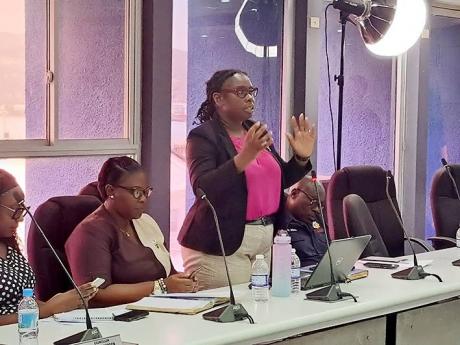St James medical officer of health warns against dengue complacency
WESTERN BUREAU:
With Jamaica’s annual hurricane season having started as of June 1, and with 1,522 reported cases of dengue fever in St James since last September, St James’ medical officer of health Dr Tanique Bailey-Small is renewing calls for citizens to take personal responsibility for curbing mosquito breeding.
Bailey-Small issued the call while addressing Thursday’s monthly meeting of the St James Municipal Corporation [StJMC], where the St James Health Department reported that the parish’s Aedes index, which is used to record the spread of dengue at the parish level, had increased to 11 per cent in May compared to six per cent in April.
“We are currently in a dengue outbreak, and the outbreak would have been declared in September 2023, and the outbreak has still not been called off. We had a decrease in November when we saw a decrease in cases, but as we put everything in context, you notice that the Aedes index which was six per cent last month has now increased to 11 per cent. What would have changed over the last month? The rain,” said Bailey-Small.
“We have certainly had an increase in rainfall, so of course we really have to be quite vigilant because once we have an increase in rainfall, we have a tendency to have an increase in the vector that causes dengue,” Bailey-Small added. “As we enter into the hurricane season, we just have to be vigilant. We will have increased rainfall, so the importance now is of not just making sure we take care of ourselves, but personal responsibility comes into play.”
Bailey-Small stressed that citizens cannot afford to get careless about dengue safety.
“In terms of our total suspected, confirmed, and probable cases, up to June 5, St James has recorded 1,522 cases. We had 174 confirmed cases, and the number has not changed over the last few months because St James did not have any new confirmed cases since the start of the year, but again, we cannot become complacent with this,” said Bailey-Small.
“The Health Department does the education [about dengue] and vector control activities, and of course from our councillors there are the discussions with community members to ensure that we’re doing what we’re to be doing; making sure we’re checking our properties for breeding sites and making sure we decrease the chance of breeding inside our homes as well. It’s a collaborative effort, we all have a role to play, and it starts at the personal level,” Bailey-Small noted.
PROACTIVE MEASURES
The 1,522 overall suspected, probable, and confirmed cases for St James reflects an increase of an additional 25 reported cases since the previous sitting of the StJMC in May, where it was disclosed that the parish had 1,497 reported cases of dengue since last October.
World Health Organization reports indicate that global dengue cases rose from 505,430 cases in 2000 to roughly 5.2 million in 2019, while more than 6.5 million cases and 7,300 dengue-related deaths were recorded in 2023.
The St James Health Department reports that 26,218 households across the parish were inspected last month, of which 3,003 were found to be positive for mosquito breeding sites. Additionally, 84,000 containers were checked across different properties, of which 6,450 were positive for mosquito breeding, and 25 communities underwent mosquito fogging.
In the meantime, St James’ acting chief public health inspector Sherika Lewis told Thursday’s meeting that the Health Department is continuing proactive measures to control the parish’s dengue spread, to include mapping of the most at-risk locations for the vector.
“For the hurricane season coming up, for vector control, we have beefed up our activities to include refresher training of all public health inspectors, to ensure that we can appropriately respond in the event of a disaster,” said Lewis.
“We were conducting for the month of May an audit of all our equipment to ensure we can quickly respond. We have commenced health education in communities with regard to vector control and how to prevent and control mosquito-borne diseases, and in-house we have been analysing our data and (are) currently mapping our high-risk communities in case there is a need to respond in a timely manner,” she added.

